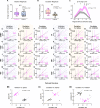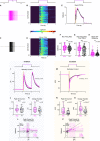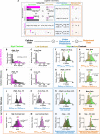Asymmetric retinal direction tuning predicts optokinetic eye movements across stimulus conditions
- PMID: 36930180
- PMCID: PMC10023158
- DOI: 10.7554/eLife.81780
Asymmetric retinal direction tuning predicts optokinetic eye movements across stimulus conditions
Abstract
Across species, the optokinetic reflex (OKR) stabilizes vision during self-motion. OKR occurs when ON direction-selective retinal ganglion cells (oDSGCs) detect slow, global image motion on the retina. How oDSGC activity is integrated centrally to generate behavior remains unknown. Here, we discover mechanisms that contribute to motion encoding in vertically tuned oDSGCs and leverage these findings to empirically define signal transformation between retinal output and vertical OKR behavior. We demonstrate that motion encoding in vertically tuned oDSGCs is contrast-sensitive and asymmetric for oDSGC types that prefer opposite directions. These phenomena arise from the interplay between spike threshold nonlinearities and differences in synaptic input weights, including shifts in the balance of excitation and inhibition. In behaving mice, these neurophysiological observations, along with a central subtraction of oDSGC outputs, accurately predict the trajectories of vertical OKR across stimulus conditions. Thus, asymmetric tuning across competing sensory channels can critically shape behavior.
Keywords: accessory optic system; behavioral reflex; computational biology; direction selectivity; mouse; neuroscience; retinal ganglion cells; sensorimotor; systems biology; visual system.
© 2023, Harris and Dunn.
Conflict of interest statement
SH, FD No competing interests declared
Figures






























Update of
- doi: 10.1101/2022.06.10.495717
References
-
- Al-Khindi T, Sherman MB, Kodama T, Gopal P, Pan Z, Kiraly JK, Zhang H, Goff LA, du Lac S, Kolodkin AL. The transcription factor Tbx5 regulates direction-selective retinal ganglion cell development and image stabilization. Current Biology. 2022;32:4286–4298. doi: 10.1016/j.cub.2022.07.064. - DOI - PMC - PubMed
Publication types
MeSH terms
Grants and funding
LinkOut - more resources
Full Text Sources
Other Literature Sources
Miscellaneous

